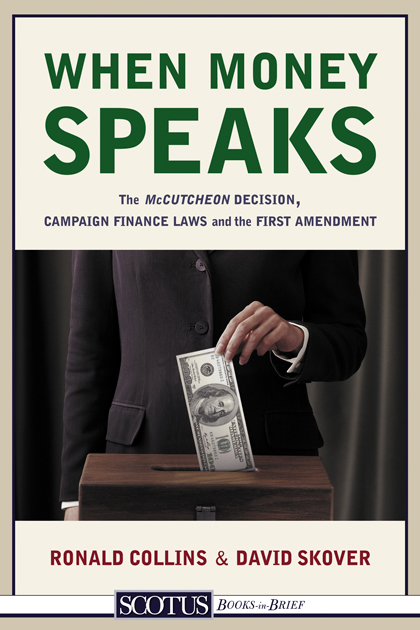
|
WHEN MONEY SPEAKSTHE McCUTCHEON DECISION, CAMPAIGN FINANCE LAWS, AND THE FIRST AMENDMENT
April 3, 2014 | Law/Political Science
eBook | 264 pages | ISBN 978-1-938938-14-6 | $6.99 Trade Paper | ISBN 978-1-938938-15-3 | $19.99 On April 2, 2014, the U.S. Supreme Court struck down aggregate limits on how much money individuals could contribute to political candidates, parties, and committees. The McCutcheon v. FEC decision fundamentally changes how people (and corporations, thanks to Citizens United) can fund campaigns, opening the floodgates for millions of dollars in new spending, which had been curtailed by campaign finance laws going back to the early 1970s. When Money Speaks is the definitive—and the first—book to explain and dissect the Supreme Court’s controversial ruling in McCutcheon, including analysis of the tumultuous history of campaign finance law in the U.S. and the new legal and political repercussions likely to be felt from the Court’s decision. McCutcheon has been billed as “the sequel to Citizens United,” the decision giving corporations the same rights as individuals to contribute to political campaigns. Lauded by the Right as a victory for free speech, and condemned by the Left as handing the keys of our government over to the rich and powerful, the Court’s ruling has inflamed a debate that is not going away anytime soon, with calls for new laws and even a constitutional amendment on the Left—while many on the Right (including Justice Clarence Thomas in his concurring opinion) call for an end to all contribution limits. Two of the nation’s top First Amendment scholars—Ronald Collins and David Skover—have produced a highly engaging, incisive account of the case, including exclusive interviews with petitioner Shaun McCutcheon and other key players, as well as an eye-opening history of campaign finance law in the U.S. When Money Speaks launches a new series from Top Five Books, SCOTUS Books-in-Brief. The series aims to provide lay and scholarly readers with a reliable, informative, and engaging narrative account of significant Supreme Court rulings within days of when they come down, in a concise format and at a low price. Each SCOTUS Books-in-Brief title will be available within a week of the decision and be researched and written by a noted legal authority in the field. ADVANCE PRAISE for WHEN MONEY SPEAKS“Provides a thorough, dispassionate, and immensely readable overview of the Supreme Court’s latest offering on the stormy and ever fascinating topic of the relationship between the First Amendment and campaign finance regulation.” —Floyd Abrams “A brilliant discussion of campaign finance in America. When Money Speaks is a must for all who care about the American political system.” —Erwin Chemerinsky “When Money Speaks is a must-read for anyone interested in constitutional law, free speech, or elections. An original and welcome brand of narrative scholarship.” —Adam Winkler “Informative. Reliable. Accessible. This is the best book on the topic. And a great read, too!” —David M. O’Brien ABOUT THE AUTHORSRon Collins and David Skover are friends. Ron lives in the East, David in the West. They have been writing together for almost three decades. Their work is a joint effort, with David manning the keys and Ron pacing. They have coauthored four previous books together, The Death of Discourse (1996, 2005), The Trials of Lenny Bruce (2002, 2012), Mania (2013), and On Dissent (2013). Ron, who grew up in Southern California and graduated from the Loyola Law School in Los Angeles, is the Harold S. Shefelman Scholar at the University of Washington Law School. David, who grew up in Wisconsin and earned his law degree from Yale, is the Fredric C. Tausend Professor of Constitutional Law at Seattle University. Both have written numerous scholarly articles (often together) in journals such as the Harvard Law Review, Stanford Law Review, and in the Supreme Court Review. |

Top Five Books, LLC,
is a Chicago-based independent publisher dedicated to publishing only the finest fiction, timeless classics, and select nonfiction.
is a Chicago-based independent publisher dedicated to publishing only the finest fiction, timeless classics, and select nonfiction.
© Top Five Books, LLC. All rights reserved.





